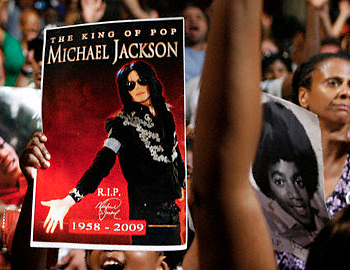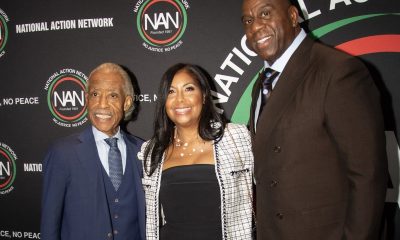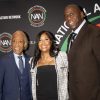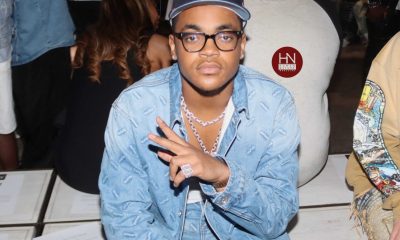Art & Style
Death of the King
Michael Jackson died a year ago and has since been mourned unlike any icon in history.
Michael Jackson held in Harlem last year.
Across the world, Jackson fans built makeshift memorials, shared personal stories via the Internet, danced at tribute parties, and even held mass re-enactments of the “Beat It” and “Thriller” videos. Some observers, who remember the public mourning following the deaths of Elvis Presley, John Lennon and Princess Diana, say the display of grief and commemoration following Jackson’s death may have eclipsed the other tragic events.
Unlike other icons, Jackson’s death occurred in the Internet age, where news of his initial hospitalization and subsequent death first appeared June 25th. Since that time, fans have gravitated to such social networking web sites as Facebook and Twitter to share their favorite personal memories of the Jackson’s music and videos, and to post links to various Jackson interviews and performances.
There’s also been debate among media pundits about how much of Jackson’s personal challenges should impact his overall legacy. News coverage of the subsequent death investigation has also been called into question by Jackson supporters, who say the media has focused too heavily on Jackson’s prescription drug use.
“There’s been an unprecedented allowance of negative, exaggerated and scandalous stories told about Michael Jackson and the Jackson family,” said the Rev. Al Sharpton at a memorial held recently at the famed Apollo Theater in New York’s Harlem section of the city. “We want to send a message around the world that you can write what you want and say what you want, Michael Jackson was ours and we are Michael Jackson and we love Michael Jackson!”
Controlling the Message
Thousands of fans waited for hours along 125th and its surrounding blocks in the rain for a chance to dance to Jackson’s hits and watch a video tribute to the “King of Pop.” Joined by Jackson friend and collaborator Spike Lee, Sharpton led a moment of silence at 2:26 PST, the exact time with Jackson was pronounced dead five days earlier.
Sharpton and Lee each touted Jackson’s legacy, while denouncing the media coverage of the circumstances surrounding Jackson’s death. Sharpton pointedly listed several racial barriers breeched by Jackson that ultimately lead to the advancement of other African American entertainers.
“Michael Jackson broke records, he [also] broke down barriers,” Sharpton says. “Before Michael Jackson, we couldn’t get black artists on MTV. Before Michael Jackson we never heard of selling out stadiums for consecutive nights. Michael Jackson not only made music history, and pop culture history, he changed music history.”
Sharpton also suggested Jackson’s music may have contributed to greater racial tolerance among younger generations.
“Because of Michael, whites, Asians, Latinos and blacks learned how to dance, sing and go to nightclubs together. “He broke down those barriers where we could not be comfortable.”
Sharpton drew heavy applause from the audience when touting Jackson’s humanitarian efforts, which included the authoring of “We Are the World,” and support over the years for historically black colleges and universities.
“Michael came and changed that generation,” Sharpton said.
Sharpton and Jackson have had a close relationship over the years, which on one occasion became disagreeable. In 2002 Jackson made headlines by calling from Sony Music CEO and Chairman Tommy Mottola a “racist,” who was part of a conspiracy by record executives to cheat black artists.
Jackson made the remarks at Sharpton’s National Action Network headquarters in Harlem. Sharpton, while not totally denouncing Jackson, quickly sought to distance himself from the comments. Sharpton remained an informal adviser to Jackson, much as he did for soul legend James Brown, who Jackson once idolized. In 2005, Sharpton and Jackson resurfaced publicly, with the reverend touting Jackson’s right to innocence until proven guilty as the singer faced child molestation charges.
At the Jackson’s official memorial service in Los Angeles, Sharpton drew a roaring applause when he used a portion of his remarks to speak directly to the Jackson’s children. “There wasn’t nothing strange about your daddy,” Sharpton eulogized. “It was strange what your daddy had to deal with.”
Media pundits hailed the speech as Sharpton’s finest speech in years
Lee, who directed the video for Jackson’s controversial “They Don’t Really Care About Us” in 1996, also rebuked some of the recent news coverage of Jackson’s death and recent personal challenges. “Let’s wallow in the negativity they [media] trying to drag us into,” Lee said. “We not having it.”
The memorial at the Apollo bears much significance. In 1967, Jackson and his brothers won the Apollo’s Amateur Night contest, helping launch the Jackson 5. Jackson last appeared at the Apollo in 2002, attending a fundraiser at the behest of former U.S. President Bill Clinton, whose office is just steps away from the theater.
Mourning the King
Like the thousands of fans at the Apollo that day, millions of other fans have mourned Jackson since the beginning of summer, with many using creative and sincere methods to honor the King of Pop.
Such “off the wall” tributes include the Michael Jackson butter sculpture being presented an Iowa fair this year, the endless amount of celebrity messages sent using Twitter, and the rapper Game’s Michael Jackson tattoo, which received on camera while filming the music video for his tribute song “Better On the Other Side.”
Reenactments of the “Beat It” and “Thriller” videos have become instant You Tube sensations. One hit video stars a group of more than 1,000 inmates in a Philippines prison performing Michael Jackson’s “Thriller” dance routine.
Fans also mourned Jackson through his music, with fans spending heavily in records stores and online music outlets. Some fans wanted to relive the moments in which Jackson’s music played in the background of their lives. Younger fans were hoping better understand why Jackson was so adorned by their parents and close relatives.
In the end, fan support restored Jackson to the top of the charts, breaking records for posthumous music sales. In the first three weeks since his death, Jackson’s albums and compilations dominated the top 10 slots on Billboard’s Top Albums chart in the United States for the first three weeks after his death, selling more than 2.3 million albums. Reported estimates have Jackson’s albums sales reaching 9 million worldwide. Jackson’s songs topping the online download charts as well, including 2.6 million downloads in the first week after his death.
Buying Jackson’s music was a way for fans to get one last memory of Jackson. In contrast, Dorothy Ballard, a 43-year old Harlem resident, says the Apollo memorial offered her closure.
“I liked his style, his dance, his humor,” says Ballard, who says she’s been a fan since the early days of the Jackson 5. “He was just a sweet, loveable person and he’s going to be missed.”












